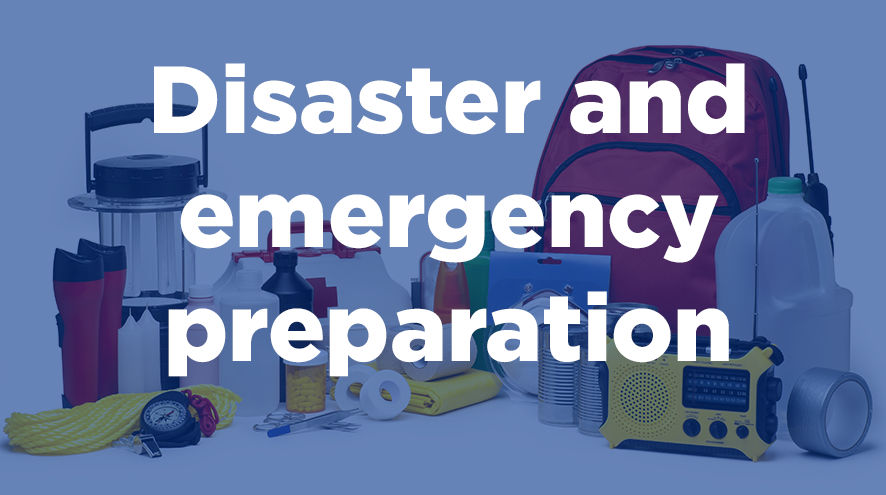Disaster and emergency preparation
Emergencies happen when we least expect them, so it’s best to be prepared. Here are some ideas to help you prepare so that if someone with dementia is involved in an emergency, you can quickly respond.

How to prepare for a disaster
Advance preparations
- If the person with dementia lives in a residential facility, find out about its disaster and evacuation plans. Ask if you will be responsible for evacuating her.
- Whether you live with the person with dementia, or you are a long-distance caregiver, make sure evacuation plans include his specific needs. Check your local Alzheimer Society and other organizations that provide services to elderly people, to see if help is available.
- Prepare an emergency kit (see below for suggestions).
Emergency kit
Consider preparing an emergency kit. Keep it in a watertight container and store it in an easily accessible location. Your emergency kit might include:
- Easy on/off clothes (a few sets)
- Supplies of medication (or minimally, a list of medications with dosages)
- Velcro shoes/sneakers
- An extra pair of glasses
- Incontinence products
- Extra identification items for the person, such as an ID bracelet and clothing tags
- Copies of legal documents, such as a power of attorney
- Copies of medical documents that indicate the individual’s condition and current medications
- Copies of insurance and social insurance cards
- Waterproof bags to hold medications and documents
- Physician’s name, address and phone numbers (including cell phone)
- Recent picture of the person with dementia
- Hand lotion or other items to promote comfort<
- Bottled water
- Favourite items or foods; liquid meals
- Pillow, toy or doll to hold for comfort
- Phone number for your local Alzheimer Society
If you know a pending disaster is about to occur
- Get yourself and the person with dementia to a safe place.
- If the need to evacuate is likely, do not delay. Try to leave as early as possible to minimize long delays in heavy traffic.
- Alert others (family, friends, medical personnel) that you are changing locations, and give them your contact information. Contact them regularly as you move.
- Be sure there are people other than the primary caregiver who have copies of the person’s medical history, medications, physician information and family contacts.
- Purchase extra medications.
- If your family member uses oxygen, be sure to obtain portable tanks.
Get more information on disaster preparedness from Public Safety Canada.
How to respond during a disaster
During an evacuation
People with dementia are especially vulnerable to chaos and emotional trauma. They have a limited ability to understand what is happening, and they may forget what they have been told about the disaster. Be alert to potential reactions that may result from changes in routine, travelling or new environments.
- When appropriate, inform others (hotel or shelter staff, family members, airline attendants) that your family member has dementia and may not understand what is happening.
- Do not leave her alone. It only takes a few minutes to wander away and get lost.
- Be alert for changes in routine, travelling and new environments, which can cause agitation, wandering and an increase in symptoms such as hallucinations, delusions and sleep disturbance.
- Do your best to remain calm. The person with dementia will respond to the emotional tone you set.
Tips for preventing agitation
- Reassure him. Hold hands or put your arm on his shoulder. Tell him that things are going to be fine.
- Find outlets for anxious energy. Take a walk together or engage him in simple tasks.
- Redirect her attention if she becomes upset.
- Move him to a safer or quieter place, if possible. Limit stimulation.
- Make sure she takes medications as scheduled.
- Try to schedule regular meals and maintain a regular sleep schedule.
- Avoid elaborate or detailed explanations. Provide information using concrete terms. Follow brief explanations with reassurance.
- Be prepared to provide more help with all routine activities.
- Pay attention to cues that she may be overwhelmed (fidgeting, pacing).
- Remind him that he is in the right place.
Helpful hints during an episode of agitation
- Approach her from the front and use her name.
- Use calm, positive statements and a patient, low-pitched voice. Reassure.
- Respond to the emotions he is expressing rather than the content of the words. For example, say, “You’re frightened and want to go home. It’s okay. I’m right here with you.”
- Don’t argue with her or try to correct. Instead, affirm her experience, reassure her and try to divert her attention. For example, “The noise in this shelter is frightening. Let’s see if we can find a quieter spot. Let’s look at your photo book together.”
Take care of yourself
- Take care of yourself by finding a good listener to hear your thoughts and feelings about the event.
- Find moments to breathe, meditate and reflect.
Be ready for an emergency department visit
Whether it is a planned admission or an unexpected emergency visit, the unfamiliar noises and activities of a hospital can be especially upsetting for a person living with dementia.
Preparation can improve a visit. Be Ready for an Emergency Department Visit is a series of handy checklists and forms for a person living with dementia to fill out with a family member, friend, or caregiver. Complete these forms before a trip to the hospital is necessary, so that the person living with dementia is ready to go. The information provided on these forms will help you communicate the person’s needs, making it possible for hospital staff to provide more personalized care.
Download the checklist to get started ►
Use the checklist as a guide to work through each of the tools in this series:
